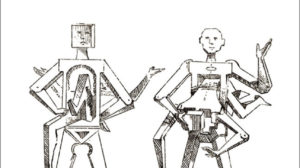 Il testo di Paolo Cellini sull’economia di internet arriva in edizione inglese: Internet economics con una prefazione di Vint Cerf. Dice Cerf: «Paolo Cellini’s book provides us with a fascinating view of the Internet as an economic phenomenon and as a general-purpose artifact that is being put to work in an endless variety of ways. It is a vast assembly of technology and institutions, driven by a variety of business models (including non-profit and government cases), and sustained by the collaboration of huge numbers of involved entities. Cellini applies economic and system analytic tools to provide readers with a deeper understanding of the Internet’s character and its role in our lives». Il punto, per Cerf, è la nozione di artefatto: «The term means, roughly, “made by man” as opposed to “found in nature”. It seems reasonable to view the progress of our species as the story of the artifacts we have created, applied, evolved and even abandoned in favor of new ones. These are almost always enabling tools that make us more efficient, more effective and more able to overcome human limitations. Artifacts often have economic consequences since they may reduce costs, increase productivity, free time for new endeavors, enable new ways of accomplishing old goals and way to accomplish new goals». Ebbene: internet è un altro artefatto. Molto grande. Con qualche caratteristica piuttosto rilevante, però. «What makes it so interesting, as Cellini elaborates in this book, is its scale and the fabric of cooperation, collaboration and coordination that allows it to work. There is no central control. There are hundreds of thousands of independent networks, each operated independently, collaborating on the basis of bilateral and multi-lateral agreements. Voluntary standards, developed in an open and collaborative fashion in multiple fora…». E come conseguenza: «The general-purpose Internet is largely application agnostic. Anything that can be implemented by the exchange and interpretation of the data in Internet Packets is fair game». E quindi internet è il luogo per eccellenza dell’innovazione. Con alcune conseguenze che chiariscono il senso della competitività di ciò che viene innovato via internet: «Like many other technologies, the Internet changes the costs or speed with which communication of information can be accomplished. In addition, because the information flowing on the Internet is machinable the users of the Internet are able to apply the Internet’s vast computing capacity to find and process an increasingly wide range of information. Barriers to trade are reduced, delivery of digital content is speeded up, discovery of others with common interests is facilitated, ability is maintained, and important business and personal relationships are enhanced». Ma perché tutto questo possa continuare occorre proteggere internet, dice Cerf, come si protegge il mercato, visto che si tratta di “tecnologie” o “dimensioni” neutrali e abilitanti: «Of course, all neutral technologies also can be abused and the Internet is no different. It is this agnostic aspect of the Internet that forces us to confront the problem of abuse with societal rules, technological protections, legal and moral strictures. Because the Internet is global in scope, these challenges are made all the more difficult to overcome». E in conclusione, fa piacere ripetere anche l’ultima frase di Cerf, per Paolo Cellini: «I hope you will find this book as insightful as I have. It is worthy of your attention if you are going to be a part of the online environment of the 21° Century». Nella sistematica lettura che Cellini offre della rete come un sistema economico una realtà emerge costante: non si tratta di un insieme di soluzioni o modelli da applicare; si tratta di uno spazio di innovazione, purché lo si comprenda.
Il testo di Paolo Cellini sull’economia di internet arriva in edizione inglese: Internet economics con una prefazione di Vint Cerf. Dice Cerf: «Paolo Cellini’s book provides us with a fascinating view of the Internet as an economic phenomenon and as a general-purpose artifact that is being put to work in an endless variety of ways. It is a vast assembly of technology and institutions, driven by a variety of business models (including non-profit and government cases), and sustained by the collaboration of huge numbers of involved entities. Cellini applies economic and system analytic tools to provide readers with a deeper understanding of the Internet’s character and its role in our lives». Il punto, per Cerf, è la nozione di artefatto: «The term means, roughly, “made by man” as opposed to “found in nature”. It seems reasonable to view the progress of our species as the story of the artifacts we have created, applied, evolved and even abandoned in favor of new ones. These are almost always enabling tools that make us more efficient, more effective and more able to overcome human limitations. Artifacts often have economic consequences since they may reduce costs, increase productivity, free time for new endeavors, enable new ways of accomplishing old goals and way to accomplish new goals». Ebbene: internet è un altro artefatto. Molto grande. Con qualche caratteristica piuttosto rilevante, però. «What makes it so interesting, as Cellini elaborates in this book, is its scale and the fabric of cooperation, collaboration and coordination that allows it to work. There is no central control. There are hundreds of thousands of independent networks, each operated independently, collaborating on the basis of bilateral and multi-lateral agreements. Voluntary standards, developed in an open and collaborative fashion in multiple fora…». E come conseguenza: «The general-purpose Internet is largely application agnostic. Anything that can be implemented by the exchange and interpretation of the data in Internet Packets is fair game». E quindi internet è il luogo per eccellenza dell’innovazione. Con alcune conseguenze che chiariscono il senso della competitività di ciò che viene innovato via internet: «Like many other technologies, the Internet changes the costs or speed with which communication of information can be accomplished. In addition, because the information flowing on the Internet is machinable the users of the Internet are able to apply the Internet’s vast computing capacity to find and process an increasingly wide range of information. Barriers to trade are reduced, delivery of digital content is speeded up, discovery of others with common interests is facilitated, ability is maintained, and important business and personal relationships are enhanced». Ma perché tutto questo possa continuare occorre proteggere internet, dice Cerf, come si protegge il mercato, visto che si tratta di “tecnologie” o “dimensioni” neutrali e abilitanti: «Of course, all neutral technologies also can be abused and the Internet is no different. It is this agnostic aspect of the Internet that forces us to confront the problem of abuse with societal rules, technological protections, legal and moral strictures. Because the Internet is global in scope, these challenges are made all the more difficult to overcome». E in conclusione, fa piacere ripetere anche l’ultima frase di Cerf, per Paolo Cellini: «I hope you will find this book as insightful as I have. It is worthy of your attention if you are going to be a part of the online environment of the 21° Century». Nella sistematica lettura che Cellini offre della rete come un sistema economico una realtà emerge costante: non si tratta di un insieme di soluzioni o modelli da applicare; si tratta di uno spazio di innovazione, purché lo si comprenda.






Commenta